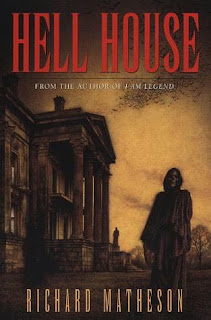The most horrifying thing about Peter Straub's Ghost Story
is not the decidedly non-ghost creature that it features, but the page
count. At 567 pages, Ghost Story is more tome than horror novel. And the font size is inexplicably small, as
if Peter Straub set out to match the style and word count of the Holy Bible.
And not the New International Version… the original Hebrew version… in hieroglyphs.
And that would be in Egyptian, not Hebrew. You can see how convoluted that got... so, too, is Ghost Story.
To be fair, Straub set out to tell a story that is bigger
than itself, and on many levels he succeeds. He takes a lot of risks,
experiments with literary flow, and overall creates a winding, complicated
journey through regret and redemption.
But where Peter Straub fails, is his Peter Straubiness… Like
his other works, he takes an almost strictly literary approach and too clumsily
walks the line between horror and self-serving platitudes.
In my other reviews, I break down the characters and the
plot. This one, I feel, should be a cautionary tale of biting off more than you
can chew…
Because right from the start, Straub tries desperately to
pull the reader into a story we don’t want to get in to. A decidedly uninteresting
prologue of 23 pages made me question my dedication to reading, writing,
speaking or hearing the English language. There were points over the 23 pages I
thought about giving up on school, slipping out of the country (leaving behind
my wife and four kids to fend for themselves) and setting up residence in a
non-English speaking country. The first 23 pages of Ghost Story made African
clicking languages inviting.
But, I persevered!
There are a lot of characters in Ghost Story. Some of them
are interesting, but most of them, by virtue of space restrictions, are not.
And there are clusters of similar names that makes it difficult to play Who’s Who in the Zoo as the story
progresses. Some of these similarities are by design, and are intended to be
devices in the narrative. Others, I think, are oversights. Here is a sampling:
Hardie, Hardester. Angie, Annie, Anni, Ann, Alma. There are generic, common
names, too: Freddie, Edward, Jimmy, Ricky. My point? It was hard to follow!
Straub himself even had difficulties keeping his characters straight. On page
409 (of my paperback copy), Straub stumbles and the character of Ricky
Hawthorne mentions the name Anna Mobley. The problem? It’s an amalgamation of
Anna Mostyn and Alma Mobley.
Eventually everybody gets straightened out, but it was such
an impediment at the beginning that I had several false starts in my reading.
Once I got in to the flow (around page 404), the book really took off for me.
I’m going to pause here for a disclaimer: If I were reading this
for leisure, and not as part of a class, I may have enjoyed it more. As it was,
it became an obstacle to overcome. Straub took so many different literary liberties,
and wrote so extensively of the mediocre, that I found myself skipping whole paragraphs
to get through the experience.
Now back to our regularly scheduled broadcast…
Let’s talk about regret. Let’s talk about fear. Let’s talk
about mistakes. Finally, let’s talk about wasps.
Regret. This is the ghost of Ghost Story. Regret over the
wrong choices made. Or so Straub would like us to think. Eva Galli is murdered,
that much is obvious from the beginning. And it seems not only plausible, but
likely the Chowder Society should be haunted by that guilt. After a couple of
them are picked off, it’s discovered that what is killing them is not a ghost,
not regret, not even old age, but a creature of ancient lineage. At that point,
regret should be absolved, and this is no longer a ghost story, but a monster story.
Not only were they justified in their killing, but they didn’t even kill
anybody! Holy shit! Straub has lost his right to preachiness at that point.
Fear. The creature in this story plays on fear, but not
startles. It plays on the fear of rejection, of regret and of the unknown.
People die in this book. Some of them die as an afterthought. I died of exasperation.
But fear actually kills a couple of people, seeing the creature as its horrible
self. Some people kill out fear. Again, it seems preachy.
Mistakes. Yup, lots of mistakes. But I’m going to focus on
an over-arching theme: Affairs. Stella’s affairs and Lewis’s affairs. They don’t
add anything to the story. They don’t move it forward. They don’t add nuances
to the characters. I’d estimate about 30 of the 67 pages are dedicated to
talking to about their affairs. Guess what? I don’t care. Especially since
Stella’s husband doesn't care, and Lewis is one of his best friends.
Finally, wasps. Some books the prologue isn’t important.
This one? It is. Without it, the Epilogue doesn’t make sense. In fact, one
could read just the prologue and epilogue and have a pretty good short story
experience.
Peter Straub is a great writer and fantastic novelist. But,
as a story teller, I find him lacking. I’ve read a lot of his work, and it’s
all pretty painful to get through. His acclaim is well earned as he truly is a
master of a craft, but it’s just not the craft he thinks it is.

